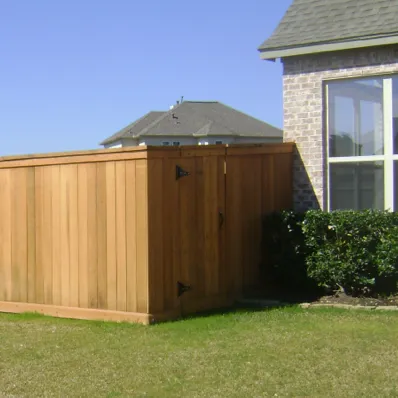What to Look For in a Reliable Fence Builder: 6 Tips
At Texas Fence, we know that choosing the right fence builder can make or break your project. We’ve all been there. You need a new fence, but figuring out who to trust feels like navigating a maze. It might seem easier to go with the first contractor who gives you a quote, but making the wrong choice can lead to costly repairs, permit problems, or a fence that won’t hold up in Houston’s weather. In this article, we’ll cover the traits that separate a reliable fence builder from the rest, so your investment adds value to your property without becoming a source of frustration.

Key Points For A Fence Builder Search
- Verify proper licensing, insurance coverage, and bonding documentation before hiring a fence contractor.
- Look for contractors who understand local weather patterns and recommend appropriate materials for your climate.
- Check their portfolio of completed projects and ask for recent client references within the past year.
- Ensure they use weather-specific installation methods and understand proper post-setting depths for your area.
- Choose contractors who request reasonable deposits rather than full upfront payments and offer clear payment terms.
Credentials and Insurance Coverage
Every reliable fence builder maintains proper licensing, bonding, and extensive liability insurance coverage. We recommend requesting proof of these credentials before signing any contracts. A legitimate contractor should readily provide their license number, insurance certificates, and bonding information.
When reviewing their insurance coverage, we need to verify both general liability and workers’ compensation policies. General liability protects your property from potential damage during installation, while workers’ comp covers any injuries that might occur on your property. Let’s also confirm their bonding status, which safeguards you against incomplete work or contractor default.
Don’t hesitate to cross-reference their license number with your state’s contractor board and contact their insurance provider to validate current coverage.
Reputable contractors typically require a reasonable deposit amount of 20-30% rather than demanding full payment upfront.
Experience in Local Weather Conditions
We’ve learned through decades of experience how seasonal weather patterns in different regions affect fence durability and longevity. Our expertise helps us match the right materials to your local climate challenges, whether that means selecting rot-resistant woods for humid areas or rust-resistant metals for coastal zones. We’ll use weather-specific installation techniques that account for soil expansion, frost heave, and seasonal moisture changes to guarantee your fence remains stable year-round. Our treated cedar and pine materials are specifically chosen to withstand harsh environmental conditions while maintaining their beauty.
Understanding Regional Weather Patterns
Understanding local weather patterns is imperative for building fences that withstand regional climate challenges. We want a fence builder who knows how seasonal changes affect different materials and construction methods in our area. A qualified contractor should demonstrate knowledge of weather-related fence requirements through their material choices and installation techniques.
They’ll understand how our region’s freeze-thaw cycles impact post depth and concrete setting. They’ll know which materials best resist our area’s specific moisture levels and UV exposure. They’ll account for local wind patterns when determining post spacing and bracing requirements. They’ll recommend appropriate drainage solutions based on our seasonal rainfall patterns.
This expertise helps guarantee we’re getting a fence that’s built specifically for our climate, saving us from weather-related repairs and premature replacement costs down the road.
Materials for Climate Challenges
When selecting a fence builder, their expertise with climate-appropriate materials stands as a critical factor in our decision-making process. We’ll want to confirm they understand which materials withstand our local weather challenges – from salt air in coastal areas to extreme temperature fluctuations in continental regions.
A reliable contractor should explain why certain materials work better in our climate. For example, they’ll know that vinyl fencing can warp in intense heat, while cedar might be ideal for moderate climates. They should discuss how aluminum resists rust in humid conditions, and why pressure-treated pine needs specific maintenance in rainy areas.
Let’s look for builders who demonstrate knowledge of material durability and can recommend appropriate sealants, stains, or protective coatings for our specific weather conditions.
Weather-Specific Installation Methods
A skilled fence builder’s experience with local weather patterns directly impacts installation quality and longevity. We recommend choosing contractors who understand how our region’s climate affects installation timing and techniques. They’ll know exactly when to pour concrete, how deep to set posts, and which seasonal conditions are ideal for different materials.
Look for builders who demonstrate:
- Knowledge of frost line depths and how they affect post-setting in winter
- Understanding of soil expansion during wet seasons and proper drainage solutions
- Experience timing installations around seasonal weather patterns
- Expertise in adjusting concrete mixing and curing times based on temperature and humidity
These weather-specific considerations guarantee your fence withstands local climate challenges while maintaining structural integrity throughout the seasons. When evaluating potential contractors, ask about their experience handling our area’s unique weather conditions.
Project Portfolio and References
Throughout our decades serving the community, we’ve built an extensive portfolio showcasing diverse residential and commercial fencing projects. Our collection includes before-and-after photos, detailed project descriptions, and client testimonials that demonstrate our expertise across various fencing styles and materials.
When evaluating a fence builder’s portfolio, we recommend looking for projects similar to your vision. Ask for references from jobs completed within the last year, and don’t hesitate to contact these clients about their experience. Key questions to ask include whether the project finished on time, if the crew maintained a clean worksite, and how well the fence has held up. We also suggest checking online reviews, Better Business Bureau ratings, and local business associations for additional verification of the builder’s reputation and reliability.
With no money down financing options available, we make it easier for homeowners to start their fencing projects immediately while maintaining high-quality standards.
Material Selection and Quality
We’ll examine material grade standards, from economy to premium options, to help you make informed choices for your fencing project. Our price-versus-quality analysis reveals how factors like wood treatment levels, metal gauge thickness, and UV-resistant coatings affect both initial costs and long-term durability. Understanding lumber grading standards, established in 1924, helps ensure you select materials with the right balance of structural integrity and visual appeal.
Material Grade Standards
Material grade standards form the foundation of every reliable fence installation. We need to guarantee that every material component meets or exceeds industry benchmarks for durability and performance. When evaluating a fence builder’s material standards, let’s focus on their commitment to quality across all elements.
Wood grades should meet American Wood Protection Association (AWPA) standards, with proper treatment levels for ground contact. Metal components must conform to ASTM International specifications for strength and corrosion resistance. Concrete mix designs should achieve minimum 2,500 PSI compressive strength for post settings. Fasteners need to meet or exceed ICC-ES evaluation criteria for structural connections and weathering resistance.
These standards aren’t just recommendations – they’re essential requirements that protect our investment and safeguard long-term fence stability.
Price vs. Quality Analysis
When evaluating fence materials, price often competes with quality in the decision-making process. We’ve found that balancing these factors requires careful consideration of long-term value rather than just upfront costs.
Let’s examine how this plays out with common materials. Premium cedar might cost 30-40% more than pressure-treated pine, but it’ll typically last 10-15 years longer with proper maintenance. Similarly, powder-coated aluminum fencing costs more initially than basic chain link but resists rust and requires minimal upkeep over its lifetime.
We recommend calculating cost per year of expected lifespan rather than focusing on purchase price alone. Factor in maintenance requirements, replacement frequency, and warranty coverage. This approach helps us identify materials that offer the best return on investment while meeting your specific needs and budget constraints.
Written Estimates and Warranties
Every professional fence installation begins with detailed written estimates and warranties that protect both the homeowner and contractor. We recommend carefully reviewing these documents before signing, as they form the foundation of your agreement.
A comprehensive estimate should outline costs, materials, timeline, and payment terms, while warranties should specify coverage terms and duration.
- Request detailed line-item estimates that break down labor, materials, permits, and any additional charges
- Guarantee the warranty covers both materials and workmanship, typically ranging from 1-5 years
- Verify that the estimate includes specific details about fence style, height, gate locations, and hardware
- Check that payment terms, project timeline, and site preparation requirements are clearly stated
A reliable fence builder will gladly provide these documents and take time to explain each component thoroughly.
Professional contractors are bonded and insured to provide additional peace of mind during the installation process.
Communication and Timeline Management
How well your fence builder manages communication and timelines can make the difference between a smooth project and a frustrating experience. We recommend looking for contractors who provide clear, consistent updates and are responsive to calls, texts, or emails within 24 hours.
A reliable fence builder should outline specific project milestones and give you a realistic timeline that accounts for permits, material delivery, and potential weather delays. They’ll keep you informed about crew schedules and notify you promptly of any changes or delays. We’ve found that the best contractors use project management software or apps to share progress updates and photos.
Ask potential builders about their communication methods and how they handle timeline changes. Those who can’t provide clear answers mightn’t have efficient systems in place for managing client relationships.
Professional installation teams demonstrate their reliability through efficient project management, consistently completing projects ahead of schedule while maintaining quality standards.
Frequently Asked Questions About Fence Builders
How Long Does a Typical Fence Installation Take From Start to Finish?
We’ll typically complete your fence installation in 1-2 days for residential projects, though larger properties or complex designs can take 3-5 days, depending on terrain, materials, and weather conditions.
Can You Install a Fence During Winter Months?
We can install fences during winter, but we’ll need to plan around frozen ground, snow, and limited daylight. We’ll check weather forecasts and guarantee concrete can properly cure between cold spells.
Do I Need Permits to Build a Fence on My Property?
We’ll need to check local zoning laws since most areas require permits for fences. Contact your city’s building department or HOA first. Don’t skip this step—it’ll save headaches later.
Will the Fence Builder Handle Utility Line Marking Before Digging?
We’ll call 811 to mark utility lines before digging, and most reliable fence builders handle this coordination for you. Make sure it’s included in your contract to avoid any confusion.
How Much Maintenance Will My New Fence Require?
We’ll need to clean and inspect your fence annually, treat wood every 2-3 years, tighten hardware, and repair damage promptly. Metal fences need rust prevention, while vinyl requires occasional washing.
Takeaway
We’ve outlined the essential factors to evaluate when selecting a fence builder. By focusing on proper credentials, local expertise, proven track records, and clear documentation, we’re better equipped to make an informed choice. Remember, we’re not just investing in a fence – we’re investing in safety, property value, and peace of mind. Let’s take time to verify these key elements before committing to any fence building project.








